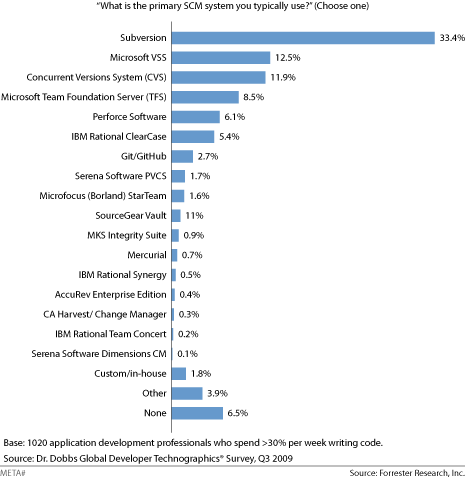What is Git's market share?
Posted at 06:00 on 26 March 2012
Git versus Mercurial arguments annoy me.
They annoy me because they’re fighting the wrong battle. Git fanatics who say that “Git has won” are so intent on killing off Mercurial that they’ve completely lost the plot with the issue that really matters. It’s old-school, inefficient, restrictive, trunk-based tools like Subversion and TFS that are the problem, not Mercurial.
People who say that “Git has won” point to the success of Github. While this is impressive, it doesn’t give the whole picture: a huge proportion of the industry is still stuck with Subversion, and the majority of corporate developers view the Github crowd as a bunch of arrogant prima donnas who believe that passion==competence and who think that they’re high-end developers simply because they blog, use Twitter, and know Ruby on Rails. Uncle Bob Martin is particularly scathing about people like that. Github is also dominated by developer tools and libraries, and seems to be significantly less popular among authors of userland software as far as I can tell.
Unfortunately, sorting out the facts from the hype isn’t easy. Version control surveys seem to be a bit thin on the ground, and usually have inbuilt biases that skew the picture somewhat. The most reliable ones would probably come from a company such as Gartner or Forrester Research, but I’ve found these a bit hard to pin down too. The most recent one that I could find was this survey from Dr Dobbs/Forrester Research (hat tip: David Richards of WANdisco):

I see no reason to doubt these figures, though they are about three years old now and I haven’t been able to find a more recent repeat of the same survey.
Aside from that, the best I can come up with is the annual Eclipse Community Survey, which is conducted every April. Since Eclipse is an IDE that tends to be widely used in enterprise settings primarily among Java developers, it’s probably the best fit for what I’m looking for, and while it largely filters out the loud Ruby on Rails type fanaticism, it unfortunately also largely ignores the .NET world, which can be infuriatingly conservative at times. However, it does paint a picture in broad brush strokes that gives some indication of how things have been changing since then.
Their figures are as follows:
Some observations here:
- The 2011 survey put Git in third place, just behind CVS (!) in second place with 13.3%. This represents a fivefold increase in two years, which makes it increasingly hard to argue that Git hasn’t yet “crossed the chasm.” The claim that “Git has won,” however, is quite clearly premature, given that Subversion users still outnumber Git users four to one.
- Mercurial, coming fourth equal alongside Perforce, has a larger market share than I expected given the demographic: I was under the impression that outside of the .NET ecosystem, it was pretty much a lost cause these days. If you were to factor in .NET developers, its mindshare relative to Git would probably be somewhat higher, since many .NET developers are still dissatisfied with Git’s Windows support and usability story. Certainly, if you’re happy with Mercurial and don’t need to contribute to projects on Github, there’s no need to switch to Git on the basis of mindshare alone at this stage.
- Subversion is starting to lose market share, and I expect this trend to continue if not to accelerate over the next year or two, so you should seriously be evaluating a distributed option for new projects sooner rather than later, otherwise you are at risk of being left behind. However, it’s too early to complain about existing projects still using it, especially if they are surrounded by a lot of process and infrastructure making migration difficult.
It’ll be interesting to see what the 2012 survey reveals, but extrapolating these figures would suggest that current market shares are probably somewhere around 18-20% for Git, 6-7% for Mercurial, and 40-45% for Subversion. This would put Git on course to overtake Subversion to the number 1 slot sometime towards the end of next year.